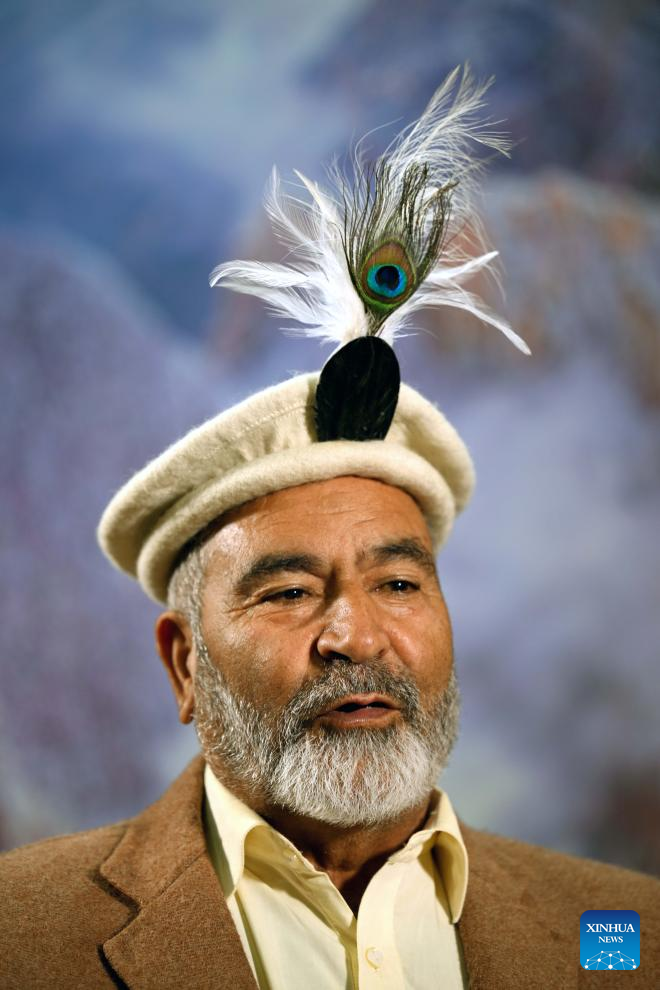
Ali Ahmad Jan speaks during an interview with Xinhua in Islamabad, capital of Pakistan on Jan. 17, 2025. (Xinhua/Ahmad Kamal)
ISLAMABAD, Feb. 17 (Xinhua) -- In the tranquil mountains of Pakistan's north Gilgit-Baltistan region, where the mighty peaks touch the sky and the winds carry whispers of history, 70-year-old gravekeeper Ali Ahmad Jan tends to a memorial that serves as a solemn testament to friendship and sacrifice.
The place called China Yadgar (the Chinese memorial) is the resting ground for 88 Chinese workers who sacrificed their lives building the Karakoram Highway (KKH).
Established in 1978, the memorial stands as a solemn tribute to those who braved the unforgiving mountain terrain and harsh weather to create the road that changed the destiny of a nation. But for Jan, it is more than just a cemetery. It is a place of cherished memories, undying friendships, and an oath he made long ago.
"I was just 19 when they came," Jan reminisces, his eyes gazing into the past. "They were strangers, yet I was drawn to them. Every day, I would go to the construction site, curious to see the foreigners building a road through the rugged mountains of my homeland."
Despite the language barrier, Jan and the Chinese workers found a way to communicate, through smiles, gestures, and laughter.
Day by day, they grew closer, bridging the gap with friendship. "We would sit for hours, sharing our joys and sorrows without speaking a word of each other's language. They became my brothers," Jan said, as his voice trembled with emotion.
But the mountains were merciless, the high altitudes and turbulent weather claimed the lives of scores of Chinese workers. Each death broke Jan's heart. "I knew every one of them who laid down their life while serving us in Pakistan," he whispered, his eyes welling up with tears. "They were not just building a road. They were building our future."
When the memorial was built, the land was barren and there was no grass, no trees, just cold, hard earth. But Jan was determined to honor his fallen friends.
"Every single blade of grass, every tree, was planted by my hands, I wanted to give them a peaceful resting place, surrounded by life and beauty," he added.
To Jan, tending the graves is not just a duty; it is a lifelong promise. "As long as I am alive, I will take care of them. And after me, my sons will continue this sacred duty," he vowed. It is his legacy -- a testament to a friendship that defied borders and time.
His dedication has touched hearts across the two countries and in 2017, when he visited China, he met an elderly woman who had lost her son during the KKH construction.
"Tears streamed down her face as she held my hands, thanking me for caring for her son's grave. She gave me money she had saved for years as a token of gratitude," Jan recalled, his voice breaking.
The bond between Jan and the Chinese families goes beyond words. Two sisters, who lost their only brother on the treacherous mountains, visited his grave years later. Their cries echoed through the valley, breaking the silence.
"Everyone who saw them was in tears. My family was in tears. My heart shattered," Jan said. "Their brother did not just sacrifice his life for Gilgit-Baltistan, but for all of Pakistan."
"They built more than just a road. They built a bridge of friendship between our nations," Jan said.
This friendship is mutual and cherished, Jan said, adding that he has been invited to China multiple times, meeting senior leaders who express their heartfelt gratitude.
"They welcome us with open arms, treating us with love and respect. We feel honored by keeping the memories of their fallen heroes alive, and they honor our friendship," Jan said, his face lighting up with pride.
Looking at the Karakoram Highway today, busy with travelers, tourists, and thriving businesses, Jan feels a mix of joy and sorrow.
"Our land was poor, it became prosperous. Our lives were hard, but they became easier. All because of the KKH and the sacrifices of those who built it. I feel a deep sense of joy seeing the road thrive, but at the same time, a quiet ache lingers in my heart for the friends whose souls rest here, but their legacy lives in every mile of the KKH," Jan said. ■



